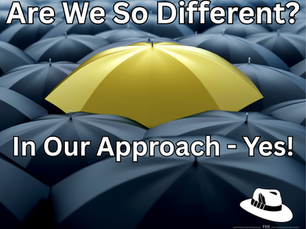top of page


How a Compassionate, Scaffolded, Evidence-Based Approach Better Serves All Youth and Teens When It Comes To Technology
Calls to delay youth access to smartphones and social media until 14 or 16 often sound protective, but evidence shows they can backfire. Safety doesn’t come from age-based bans, it comes from guided exposure, education, and parental involvement. A scaffolded, compassionate approach builds digital competence and resilience, preparing all youth for the connected world they already live in.

The White Hatter
Nov 12, 202515 min read


When Eye Rolls Become a Validation: Why That’s the Wrong Measure of Success in Digital Literacy & Internet Safety Education
Some presenters claim success when parents say their kids rolled their eyes after a safety talk, but that’s not connection, it’s disconnection. Eye rolls don’t mean learning happened; they show frustration. True digital literacy builds dialogue, not division. The goal isn’t conflict or control, it’s communication, understanding, and trust between parents, caregivers, and youth.

The White Hatter
Nov 6, 20255 min read


Why Promoting A “You Can’t Keep Up To Technology” Message To Parents & Caregivers Is Less Than Desirable.
Language shapes learning. Saying “You can’t keep up” triggers defensiveness and helplessness in parents, blocking engagement. Empowering phrases like “See if you can” foster confidence and curiosity, key to effective digital literacy education.

The White Hatter
Oct 28, 20253 min read


A Tutor, a Tool, or a Trap: Raising AI Ready Youth and Teens
AI is reshaping how youth learn, create, and connect. The White Hatter believes the outcome, empowerment or dependency, depends on the values and guidance adults provide. Parents, caregivers, and educators must stay informed, model imperfection, and keep emotional dialogue human. AI can be a tutor, tool, or trap, but with mindful use, it can enhance learning without replacing human growth or empathy.

The White Hatter
Oct 26, 20254 min read


Why “Pave the Way” Is Not Opposite to “Delay Is the Way”, It’s the Next Step Forward
When it comes to youth and technology, The White Hatter shares many principles with the “delay is the way” movement but differs in philosophy. Rather than waiting for a specific age, they advocate for a “pave the way” approach, introducing tech gradually based on a child’s maturity, not fear. Their focus is on readiness, education, and resilience through guided, age-appropriate digital experiences.

The White Hatter
Oct 14, 20254 min read


The Surprising Upside To The Balanced Use Of Social Media: What Parents & Caregivers Need to Know
A new review challenges the idea that social media is all bad for teens. While risks like anxiety and cyberbullying exist, platforms also help youth build friendships, explore identity, and access information. The key is balance. Parents and caregivers should act as “sheepdogs,” guiding, not controlling, online use through connection, curiosity, and shared responsibility. Facts, not fear, keep kids safe and empowered.

The White Hatter
Oct 12, 20256 min read


Unconditional Love: The Most Powerful Digital Safety Tool You Have!
After helping another teen in crisis online, we were reminded of a painful truth: many youth don’t reach out to parents for help because they fear punishment or losing access to technology. Real online safety isn’t about filters or bans, it’s about connection and unconditional love. When home isn’t safe, trusted adults like teachers or mentors can be that lifeline. Connection, not control, protects kids most.

The White Hatter
Oct 11, 20255 min read


Cosmo JrTrack 5 Digital Watch Review: A Thoughtfully Designed Digital Watch for Kids That Works In Canada & the USA!
Cosmo JrTrack 5 Digital Watch Review: A Thoughtfully Designed Digital Watch for Kids That Works In Canada & the USA!

The White Hatter
Oct 10, 202511 min read


Why Polls and Headlines Can Sometimes Distort How We Think About Kids and Technology
The article examines how negative media coverage and emotionally framed polls distort public perceptions about youth, technology, and social media. It critiques a 2025 Ipsos poll funded by a “delay is the way” group for bias in question wording and lack of youth input. The piece urges parents and policymakers to base opinions on balanced, evidence-driven research rather than fear or headlines.

The White Hatter
Oct 10, 20255 min read


Sharing Your Password With Your Kids? A Small Act That Builds Trust and Protects Your Family.
Sharing passwords with your kids isn’t about losing privacy, it’s about modeling trust, accountability, and preparedness. When parents show openness by sharing limited access for emergencies, it helps balance expectations and builds mutual respect. Digital trust works both ways, and leading by example teaches youth what integrity and responsible online behavior look like.

The White Hatter
Oct 5, 20253 min read


Please Mom & Dad, All My Friends Have An iPhone & Snapchat!
Deciding when to give a child their first phone is a big step. The White Hatter recommends starting with minimalist devices like Pinwheel, WisePhone, or Garmin Bounce, which allow calls and texts but avoid social media risks and data collection. These phones help kids stay connected without constant comparison or exposure to harmful algorithms, fostering healthier digital habits before upgrading to a full smartphone.

The White Hatter
Oct 3, 20253 min read
bottom of page
